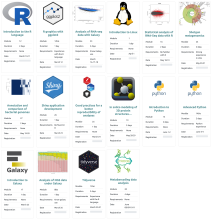 Migale Bioinformatics Facility
Migale Bioinformatics Facility
We provide several services for scientists to deal with life sciences data
Our Services
Migale, one of the Collective Scientific Infrastructure of INRAE, is part of the BioinfOmics Research Infrastructure of INRAE for bioinformatics. It is also a member of IFB (Institut Français de Bioinformatique), the French bioinformatics infrastructure and associated facility of France Génomique, the French genomic infrastructure for which we contribute to support different developments in bioinformatics.
A free account gives you access to work and save directories for your data, and access to the computer farm for your analyses.
The cluster farm is composed of about a thousand cores organized in different queues. We use the Sun Grid Engine queuing system for managing jobs.
You have a free access to our Galaxy server. Galaxy allows non-bioinformaticians to easily run tools without technical knowledges.
Command line tools, R packages and Galaxy wrappers are available on request and accessible to all migale authenticated users.
We provide an access to a large set of public biological databanks including whole genomes, nucleic and proteic sequences and other resources. They are updated automatically with BioMaJ or upon request.
We write tutorials to help you get familiar with tools, best practices, languages, etc.
Each year, we offer our "Bioinformatics by practicing" cycle. This cycle covers a broad spectrum of bioinformatics. The modules mix theoretical part and practical work.
We answer to the most common questions regarding the technical difficulties you can go through on our infrastructure.
Find all the ways to contact us.
Planned shutdown of all services from September 22d to 25th 2025
Access to the Migale bioinformatics facility will be unavailable from Monday, September 22nd to Thursday, September 25th 2025.
Update R
 R 4.5.1 is now the default version on migale
R 4.5.1 is now the default version on migale
 3.21
3.21
CHANGES IN R 4.5.1
NEW FEATURES
The internal method of unzip() now follows unzip 6.00 in how it handles extracted file paths which contain "../"


